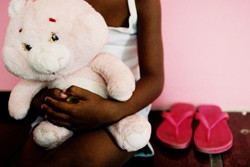
For decades, human trafficking for sexual exploitation in Brazil was viewed as an isolated phenomenon, not a systemic problem. The lack of visibility made it difficult for victims to identify those who could help. It also made it hard for organizations that wanted to help to collaborate with each other.
In response, USAID and its partners developed a program to give victims access to health, education, and psycho-social services through a help network known as Sentinela. Using qualified governmental and non-governmental service providers, the program helps victims reintegrate into society.
The program also provides specialized training to health, education, justice, and social service experts. In coordination with local universities, it produces booklets, articles, and publications for public awareness campaigns.
Sentinela has gained recognition as an effective model for combating trafficking and is being expanded from six to 24 sites. USAID is providing technical assistance, and partners including the Brazilian government, local universities, and the Organization of American States are helping to fund the expansion. Brazil’s government hopes to bring the program to another 97 cities in 2006 and a total of 930 cities in the future.
The next step is to improve the capacity of police, prosecutors, and judges to investigate, apprehend, and punish trafficking gangs. With funding from the U.S. Presidential Initiative on Trafficking in Persons, USAID is now helping build this capacity.
Trafficking in persons and sexual exploitation continue to be pervasive problems in Brazil. But in the program’s three years, it has made visible progress. Trafficking and sexual exploitation denunciations have almost doubled since the program’s start. “As people become more aware of commercial sexual exploitation, they loose their fear of denouncing it,” said Socorro Santos, a Sentinela staff member. The fight against trafficking will be long, but the progress made so far proves that it is one worth fighting.







Comment
Make a general inquiry or suggest an improvement.